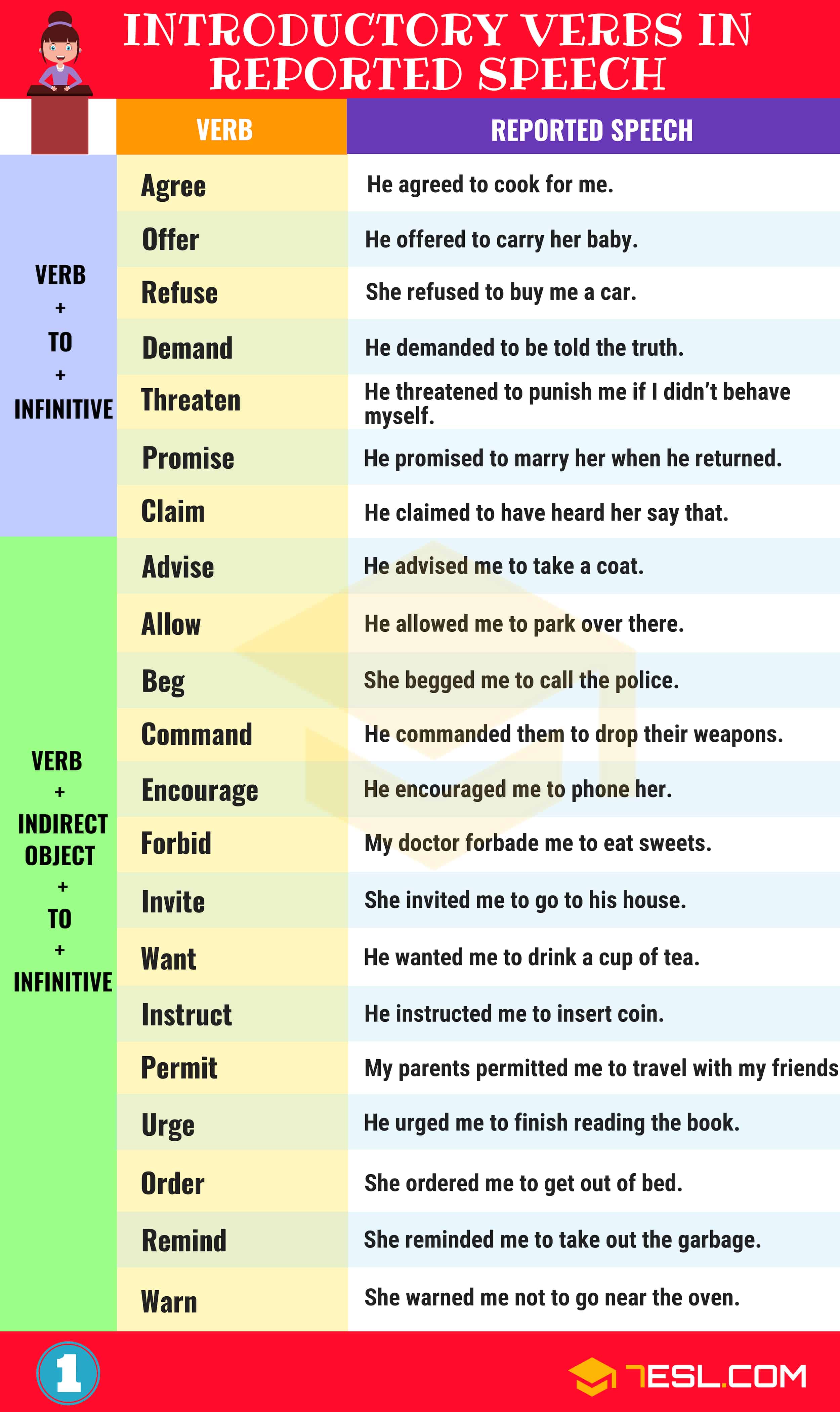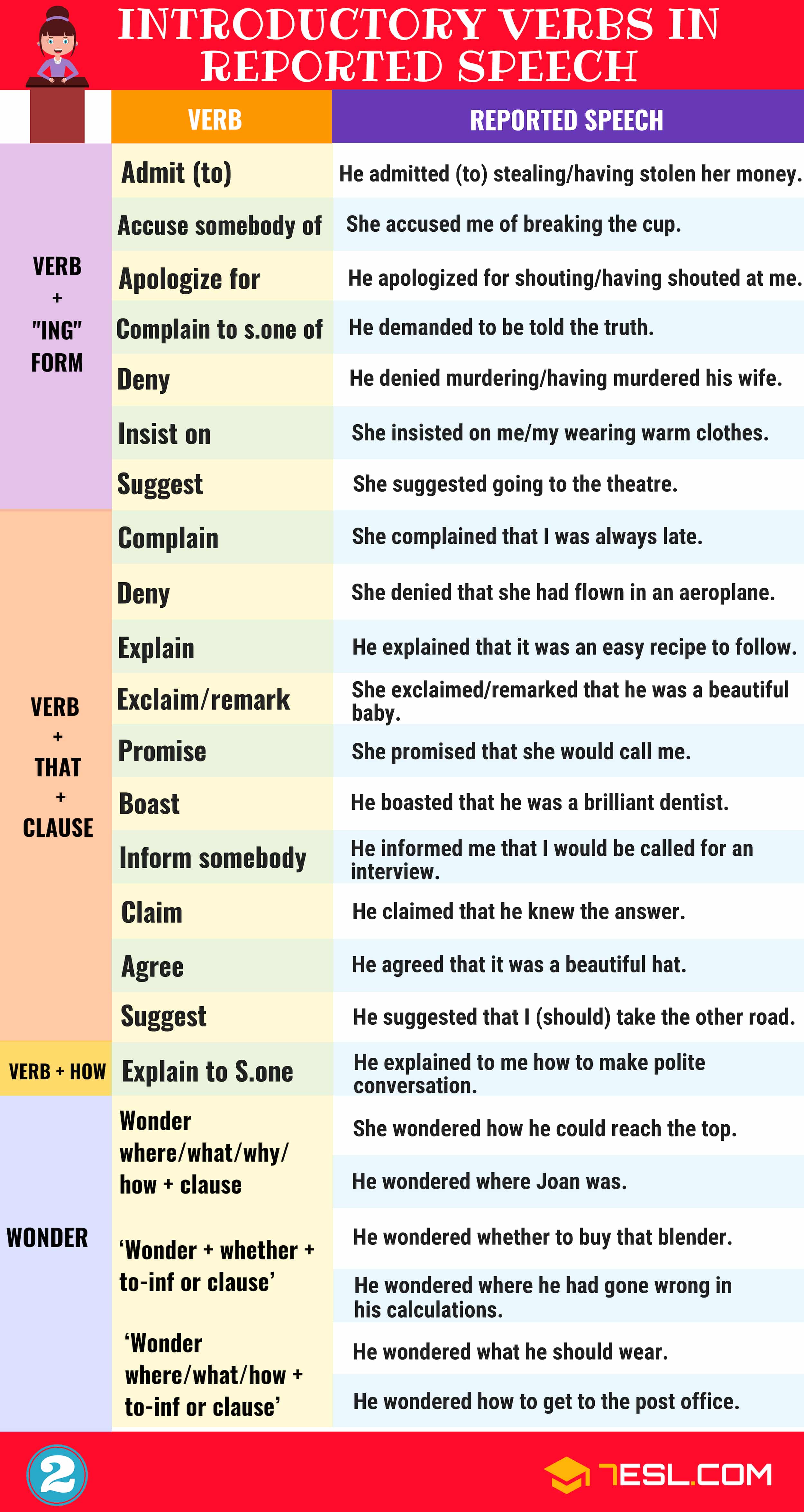Reported speech is a very common thing in the English language. We do it almost every day, in conversation and in writing. The problem is, sometimes there can be some confusion around the topic. So today we’ll take a look at reported speech: what it is, how to use it, and we’ll look at some good examples of reported speech too, so you can see how it looks in everyday conversations or writing.
Reported Speech
When we use reported speech, we are referring to something that was said either by ourselves or by someone else in the past. An example of this might be ‘he said that he was going shopping.’
This type of speech is used very frequently during both spoken and written examples of English and it is an important part of the language which any English student will find useful to learn. In this section, we are going to look at types of reported speech as well as how we can use it.
What is Reported Speech?
Reported speech is simply when we tell somebody what someone else said. You can do this in your writing, or in speech. Reported speech is very different from direct speech, which is when you show what somebody said in the exact way that they said it. In reported speech though, you do not need to quote somebody directly.
Instead, we use a reporting verb, such as ‘say’ or ‘ask’. These reporting verbs are used to report the speech to someone else. There are many different reporting verbs that can be used, and we’ll try to use different ones throughout this article to show you some examples, but you can always do some research too if you want to learn more examples for yourself.
In short, reported speech is the linguistic technique that we use to tell somebody what someone else’s direct speech was. In reported speech though, you may need to make certain changes to the grammar to make the sentence make sense. So, we’ll look at some grammar change examples below and highlight what needs to be changed.
Reported Speech Examples
When we use reported speech, we are usually talking about the past (because obviously, the person who spoke originally spoke in the past). The verbs therefore usually have to be in the past too.
For example:
- Direct speech: I’ve lost my umbrella.
- Reported speech: He said (that) he had lost his umbrella.
Reported Speech Rules
When changing from direct to indirect speech, you need to change the grammar in certain ways. In this section, we are going to be looking a little more closely at direct and indirect speech and how they are used.
Verb Tense Changes in Reported Speech
Present
If the reporting verb is in the present tense, then very little needs to be done to the direct speech sentence to change it. Here’s an example.
- Direct speech: I like dogs.
- Reported speech: She says she likes dogs.
Here nothing really needed to be changed except the pronoun, because you are now talking about somebody else, so ‘I’ becomes ‘She’ or ‘He’. The tense is still the same because ‘says’ is the present tense version of the reporting verb. But what happens if the sentence needs to be changed to past tense?
Past
Sometimes it is necessary to change the reporting verb into the past tense if what was said is no longer relevant, or was said sometime in the past. Here are the changes that would need to be made.
- Direct speech: I like dogs.
- Reported speech: She said she liked dogs.
As well as changing the pronouns here, we’ve had to change the tense of both the reporting verb and the verb. So, ‘says’ becomes ‘said’ and ‘like’ becomes ‘liked’.
Direct and indirect speech

When the reporting verb is in the past tense, verb tense forms usually need to change. The tenses generally move backward in this way:
- Present Simple Tense into Past Simple Tense
- Present Continuous Tense into Past Continuous Tense
- Present Perfect Tense into Past Perfect Tense
- Past Simple Tense into Past Perfect Tense
- Past Continuous Tense into Past Perfect Continuous Tense
- Past Perfect Tense (the tense remains unchanged)
Future
If somebody is talking about what will happen in the future then, again, you will need to change the tense of the reporting verb.
- Direct speech: I shall leave in a moment.
- Reported speech: She said that she would leave in a moment.
Notice how ‘shall’ and “will” become ‘would’ here in order for it to make sense.
- Will into Would
- Will be into Would be
- Will have into Would have
- Will have been into Would have been
Modal verbs actually have a very interesting relationship with reported speech, so we’ll look at that below too.
Modal Verbs and Reported Speech
We’ve already covered modal verbs in another article, but it’s interesting to see how they are changed in reported speech.
- Can into Could
- Could (The verb remains unchanged)
- Have to into Had to
- Must into Must/Had to
- May into Might
- Might (The verb remains unchanged)
- Should (The verb remains unchanged)
Let’s take a look at some examples.
- Direct speech: Will I see you later?
- Reported speech: He asked if he would see me later.
In the direct speech example you can see the modal verb ‘will’ being used to ask a question. Notice how in reported speech the modal verb ‘will’ and the reporting verb ‘ask’ are both written in the past tense. So, ‘will’ becomes ‘would’ and ‘ask’ becomes ‘asked’. It’s important in reported speech to make sure that each part of the sentence is in the same tense.
Sometimes though, modal verbs do not need to change tense because they already read correctly. Here’s an example.
- Direct speech: I should go to the park.
- Reported speech: He told me he should go to the park.
Notice that nothing needed to be changed here to fit the past tense reporting verb ‘told’. ‘Should’ does not need to be changed grammatically for either sentence to make sense. But you will notice that because we decided to use the reporting verb ‘told’ instead of ‘said’, we had to include the pronoun ‘me’ for it to make sense.
- Reported speech: He told me he should go to the park.
- Reported speech: He said he should go to the park.
Both of these sentences make grammatical sense, because we added the pronoun ‘me’ after ‘told’ in the first sentence, but we didn’t after ‘said’ in the second one. Here is the incorrect versions so you can see why it doesn’t work grammatically:
- Incorrect reported speech: He told he should go to the park.
- Incorrect reported speech: He said me he should go to the park.
In order to make the top one make sense, we need to add ‘me’ like we did in the correct examples above. In order to make the second one make sense, we would either have to remove ‘me’ like we did in the correct one above, or we would have to add another word. So that it looked like this.
- Reported speech: He said to me he should go to the park.
The above sentence makes sense, but sometimes you have to watch your wording of certain things to make sure that you aren’t over-speaking/writing. This can be a problem if you are trying to get your point across quickly. You should always choose the option that is quickest to say/write because it sounds/looks better and you run less risk of making a grammatical mistake.
This guide could not possibly be extensive, because there are many grammar rules that need to be followed when reporting speech, but they vary wildly. The take-home message should really be that when reporting speech, it is important to think carefully about what you are going to say or write, so you know it makes sense. Hopefully, this guide served as a good starting point though, so you can identify reported speech now, and start to think about which grammar rules are applied.
Direct and Indirect Speech
Changes in Time and Place in Reported Speech
Time and place references often have to change in Indirect Speech
- Now –> Then
- Today –> That day
- Here –> There
- This –> That
- Tomorrow –> The following day/ The next day/ The day after
- Next week –> The following week/ The next week/ The week after
- Yesterday –> The previous day/ The day before
- Last week –> The previous week/ The week before
- Ago –> Previously/ Before
- Tonight –> That night
Changes in Time and Place in Reported Speech | Image
No Change in Verb Tenses in Reported Speech
There is no change in verb tenses in Indirect Speech when:
- The introductory verb is in the Present, Present Perfect or Future.
- If the reported sentence deals with a fact or general truth.
- The reported sentence contains a time clause.
- The verb of the sentence is in the unreal past (the second or the third conditional).
- The subjunctive stays unchanged in the subordinate clause.
- Had better, could, would, used to, should, might, ought to and mustn’t remain unchanged.
- If the speaker reports something immediately or soon after it was said.
No Change in Verb Tenses in Reported Speech | Image
Reporting Verbs in Indirect Speech
List of reporting verbs in reported speech.
- Tell, say, ask.
- Verb + that + clause: complain, deny, explain, exclaim, remark, promise, boast, inform somebody, claim, agree, suggest.
- Verb + to + infinitive: agree, offer, refuse, demand, threaten, promise, claim.
- Verb + indirect object + to + infinitive: advise, allow, beg, command, encourage, forbid, invite, want, instruct, permit, urge, order, remind, warn.
- Verb + “ing” form: admit (to), accuse somebody of, apologize for, boast about/ of, complain to somebody of, deny, insist on, suggest.
- Verb + how: explain to somebody.
- Wonder.
Introductory Verbs in Indirect Speech | Image 1
Introductory Verbs in Indirect Speech | Image 2
Changes of Pronouns in Reported Speech
In indirect speech, you need to be careful with personal pronouns. They need to be changed according to the situation. You need to know the context.
Changes of Pronouns in Indirect Speech | Image
Reported Questions in English
When you are changing a question from direct speech into indirect speech, you follow the same kinds of rules as for statements.
To report a question, we use verbs such as inquire, wonder, want to know, ask…
Reported Questions in English | Image
Reported Commands and Requests in English
Reported Orders, Commands, and Requests are formed using the to-infinitive and not to-infinitive.
The reporting verbs for the orders/ commands/ requests are order, shout, demand, warn, beg, command, tell, insist, beseech, threaten, implore, ask, propose, forbid…
When we change from direct to indirect speech, the pronoun and tense changes are also needed.
Reported Commands and Requests in English | Image
















0 Comments